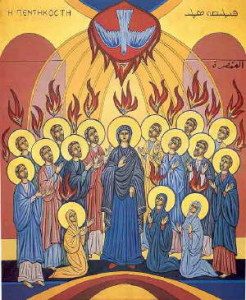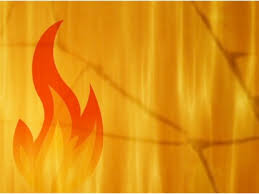Come, Holy Spirit
The Day of Pentecost 2018
And suddenly from heaven there came a sound like the rush of a violent wind
In those days I will pour out my spirit on all flesh, and your sons and your daughters shall prophesy, and your young men shall see visions; and your old men shall dream dreams.
 Last night our Parish hosted “Movies in the Park” at Perth Street Park, Camp Hill.
Last night our Parish hosted “Movies in the Park” at Perth Street Park, Camp Hill.
As I arrived at the park, suddenly I felt at ease with the world. Life was good. For us it would be a lot of work, of course, turning and selling the sausages: but the grass and the trees were rustling in the breeze: the world was alive. People were gathering as twilight fell; the kids were playing, and then the stars came out.
Here, I felt, was the Holy Spirit. It was blowing, like the wind: in fact, Spirit (Pneuma) means wind or breath. The Holy Spirit is the dynamism in and through creation, which in the first book of the Bible, Genesis, is said to move over the primordial waters.
When, as last night, the world is alive and our hearts grow soft, we can catch this wind of God.
I was reflecting lately how one philosopher in the mid-twentieth century, Josef Pieper, claimed that the festival or carnival is very close to worship. His was a rallying cry to reject the servile culture of “total work” and to recover leisure—to recover the spirit of festival.
He says
In leisure, one celebrates the end of work by allowing one’s inner eye to dwell for a while upon the reality of the creation. Look and affirm: it is good. Now the highest form of affirmation is the festival, [which is] “the union of tranquility, contemplation, and intensity of life.” To hold a celebration means to affirm the basic meaningfulness of the universe and a sense of oneness with it, of inclusion within it. In celebrating, in [feasting], one experiences the world in an aspect other than the everyday. (p.48)
And the purest form of festival, of celebration, is he says divine worship.
It is a bold connection: but to me it made perfect sense, seeing the happy faces at the Perth Street Park. People were catching the Spirit—the breeze of God. And here, too, was a kind of spontaneous order. People were, maybe hesitantly, maybe shyly, paying attention to one another as equals, in a spirit of trust and friendship. Suddenly the life of the community emerged, as if from a deep freeze. All this was from God and, in a way, all of this was worship.
In medieval Europe, the religious nature of the festival was much clearer: then the great carnival of the year was the Corpus Christi festival. On that day, everyone stopped work to realise a kind of spontaneous order: social heirarchies fell away. As the Eucharist bread was lifted high in its ornamental case, called a monstrance, the people experienced God’s presence in their midst. This was the great festival for the renewing of the social bond.
…
Sometimes, as we hear in our reading this morning from Acts, the Spirit of God can fall with an unmistakeable force. And suddenly from heaven there came a sound like the rush of a violent wind. All of them were gathered together in one place, each speaking their own languages—yet the Spirit of God blew mightily, and the heart of each was turned to the other. Their was understanding across every division. Their hearts sang in harmony.
Yet it can be very difficult for us to catch the Spirit. We live in a pressured world where people rarely have time for leisure, let alone for a carnival. Our world is hard and inorganic: our glass and steal and concrete cities stand defiantly. They do not rustle in the breeze. Maybe we are confined to a work cubicle where we sift through accounts. So it is hard for us to feel the breeze of God blowing across our lives.
We are perhaps like the first disciples: as the gospels tell us, their hearts were hardened.
So I thought: wouldn’t it be great if we could offer people a new way—the way of festival, the way of celebration? The festival begins simply with the joy of being with one another, the joy of spontaneity; but it ends with contemplation. Perhaps the festival can itself be a way into the life of the Church.
Could we commit ourselves to hosting events? Could we offer a generous space for hospitality? Or could we perhaps offer something more organic—under the trees and close to the earth—a place where kids can run and play, stories can be told, and the life of the community can emerge again?
Perhaps our task in the current situation is simply to open up a space. Indeed, this will be a sign, even in the midst of the secular city, of the world that is to come. Too often we as a Church forget that we are called to pioneer a new human future, a future when the Pentecostal fire will be known and felt. In those days, says the prophet Joel,
I will pour out my spirit on all flesh, and your sons and your daughters shall prophesy, and your young men shall see visions; and your old men shall dream dreams.
May we have the courage to dream and to dance again!
Come, Holy Spirit, our hearts inspire, and lighten us with celestial fire.
Amen.

